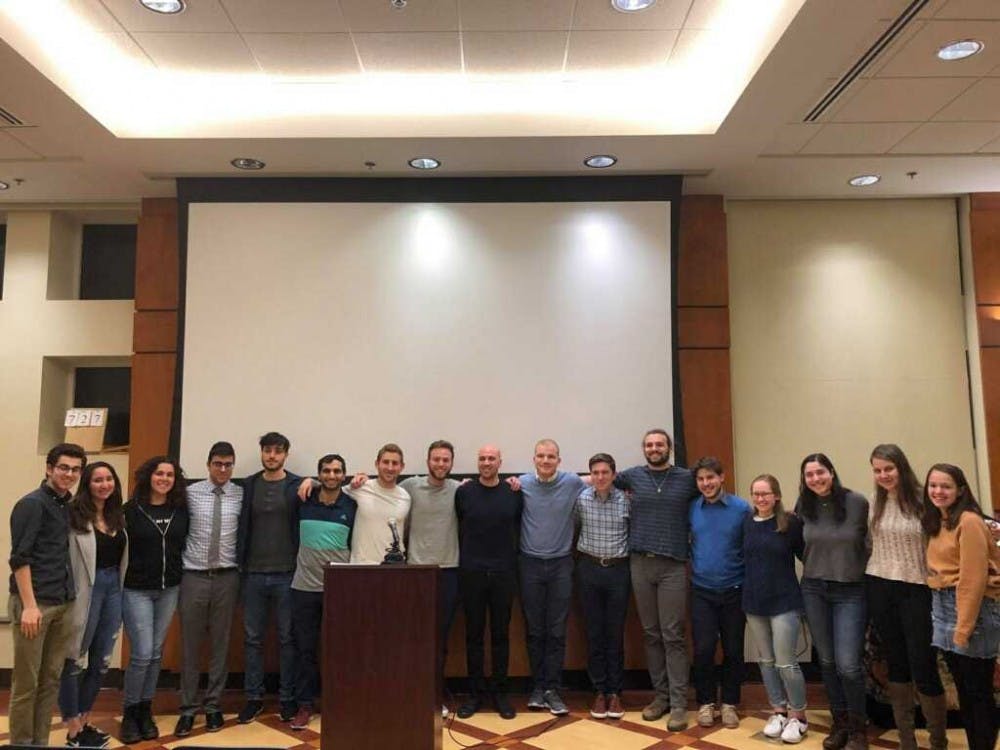Hopkins American Student Partnership for Israel (HAPI) hosted an event called, “Benjamin Anthony: Antisemitism in the 21st Century,” on Tuesday in the The Smokler Center for Jewish Life. Anthony, a reservist in the Israeli Defense Forces (IDF), discussed personal experiences with anti-Semitism in his youth in England and his views on the state of Israel, of which he is now a citizen. Anthony is also the founder and director of Our Soldiers Speak, a nonprofit organization devoted to sending Israeli soldiers to speak to foreign audiences.
Anthony explained that his background makes him a qualified educator on the topic of anti-Semitism. He explained that as a teenager he and his brothers were brutally attacked by a gang of anti-Semitic men.
Anthony believes that Jewish people in the U.K. are more conscious of anti-Semitic acts. He also stated that he is concerned about the rise of anti-Semitism in the U.S.
“The first thing that I wanted people to take away from the event is the fact that anti-Semitism is unmasked and running rampant in Europe,” Anthony said. “And that those who come from Europe recognize that fact. Anti-Semitism is in the United States and is just in the process of becoming unmasked.”
Anthony broadened the definition of anti-Semitism to include situations where Jewish people are subject to unfair treatment. He used the term “people of Israel” as another way to refer to Jewish people, both those who live within and those who live outside of Israel.
“In terms of defining anti-Semitism, I believe that anti-Semitism is defined thus: demanding of the people of Israel that we accept upon ourselves a standard that no other people would be so much as asked to consider,” Anthony said.
Anthony drew a distinction between anti-Semitism in the U.S. and anti-Semitism in the U.K. He characterized the historical situation of Jews in the United States as generally favorable, but in an interview with The News-Letter, he cautioned that American Jews might, therefore, be less likely to notice anti-Semitism.
“I believe very strongly that whereas in the United Kingdom anti-Semitism is perceived but the communities are unable to combat it, in the United States the community is able to combat it... but the community does not perceive it as a consequence of a very positive Jewish existence in the United States,” he said.
Anthony believes that Representative Ilhan Omar’s tweets and similar comments constitute anti-Semitism because they suggest that Jews should be called out for loving Israel, even though other ethnic and social groups celebrate their own culture. Omar has received criticism from both Republicans and Democrats over her tweets. The House of Representatives passed a bill to reduce anti-Semitism and other forms of bigotry in response to this criticism.
Anthony believes that the bill should have targeted only anti-Semitism.
Sophomore Jeremy Costin, an attendee of the event, disagreed. Although he thinks that a few of the beliefs that Anthony expressed were common among Jewish people, he has no issues with how the bill was written. He also believes that statements such as Omar’s could be avoided through increased education.
“I like the way that bill turned out because we should just be nice to each other,” Costin said.
Sophomore Izzy Rubin also attended the event and was surprised to learn that other Jewish campus organizations, Hillels, across the U.S. have limited contact with members of the Israeli Defense Forces.
“For me, if felt natural that an IDF soldier might feel welcomed to speak at a Hillel,” Rubin said. “I think it’s interesting that he mentioned that a lot of [Hillels on] college campuses in America might not be okay with having the IDF come.”
Rubin also appreciated Anthony’s personal stories. She stated that she had not previously known about the state of anti-Semitism in the U.K.
“I think it was really interesting how he drew on his personal upbringing and his own personal experiences,” Rubin said. “He told stories about his childhood and what it was like growing up in the U.K. and comparing and contrasting that with our upbringings in America.”
Isaac Adlerstein, the event organizer and a member of HAPI, acknowledged that Anthony’s views are conservative. However, Adlerstein believes that Anthony’s politics stem from his experience as an Israeli soldier and speaking on college campuses.
“Benjamin is to the right of the [political] spectrum, which I certainly don’t think is a bad thing,” Adlerstein said. “I think that comes from the fact that he’s a realist. He’s had experience on the ground. He served in the Israeli Defense Forces, directly experienced anti-Semitism in the United Kingdom, and he’s been to more than 450 college campuses. So I think when Benjamin speaks, he speaks from personal experience.”
Adlerstein stressed that HAPI is a nonpartisan organization and explained that he would welcome speakers from the other side of the political spectrum, but his personal relationship with Anthony made it easier to bring him to campus.
“I would love to bring both sides of the aisle,” Adlerstein said. “The reason why I reached out to Benjamin was solely a matter of convenience. I have a close personal connection to Benjamin, it was easy to get him over here.”





